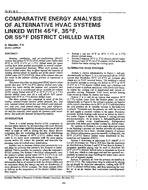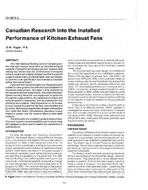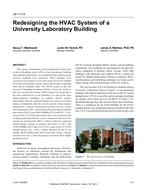The energy use of facilities with commercial food service equipment is affected by building construction regulations. One major contributor to energy use and demand is the requirement for an exhaust system and the amount of exhaust required. This, in turn, impacts the HVAC system. Reviews building construction regulations, their basic differences, and their impact on exhaust and ventilation. In so doing, it focuses on the opportunity for reducing exhaust requirements, which could have a positive impact on HVAC systems’ design and energy use. A review of existing codes indicates an unusual lack of uniformity in the way commercial cooking equipment exhaust criteria are presented in codes and applied throughout the US. Many provisions do not recognise the quantity or quality of cooking process effluent. In so doing, they frequently disregard important differences in cooking process, level, or degree of hazard. Recognition of these differences can provide the basis for research, regulatory revision, and systems changes that can effect a reduction in energy use.
KEYWORDS: USA, building regulations, construction, commercial, kitchens, ventilation, exhaust hoods, energy consumption, cooking, combustion gases, heat, odour, moisture, smoke
Citation: ASHRAE Trans. 1992, vol.98, Part 1, Paper number AN-92-16-5, 1227-1235, 4 tabs.
Product Details
- Published:
- 1992
- File Size:
- 1 file , 1 MB
- Product Code(s):
- D-18129


